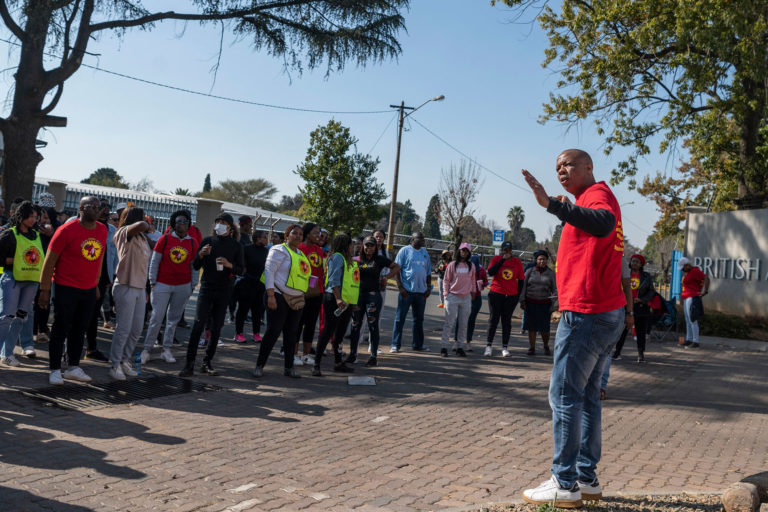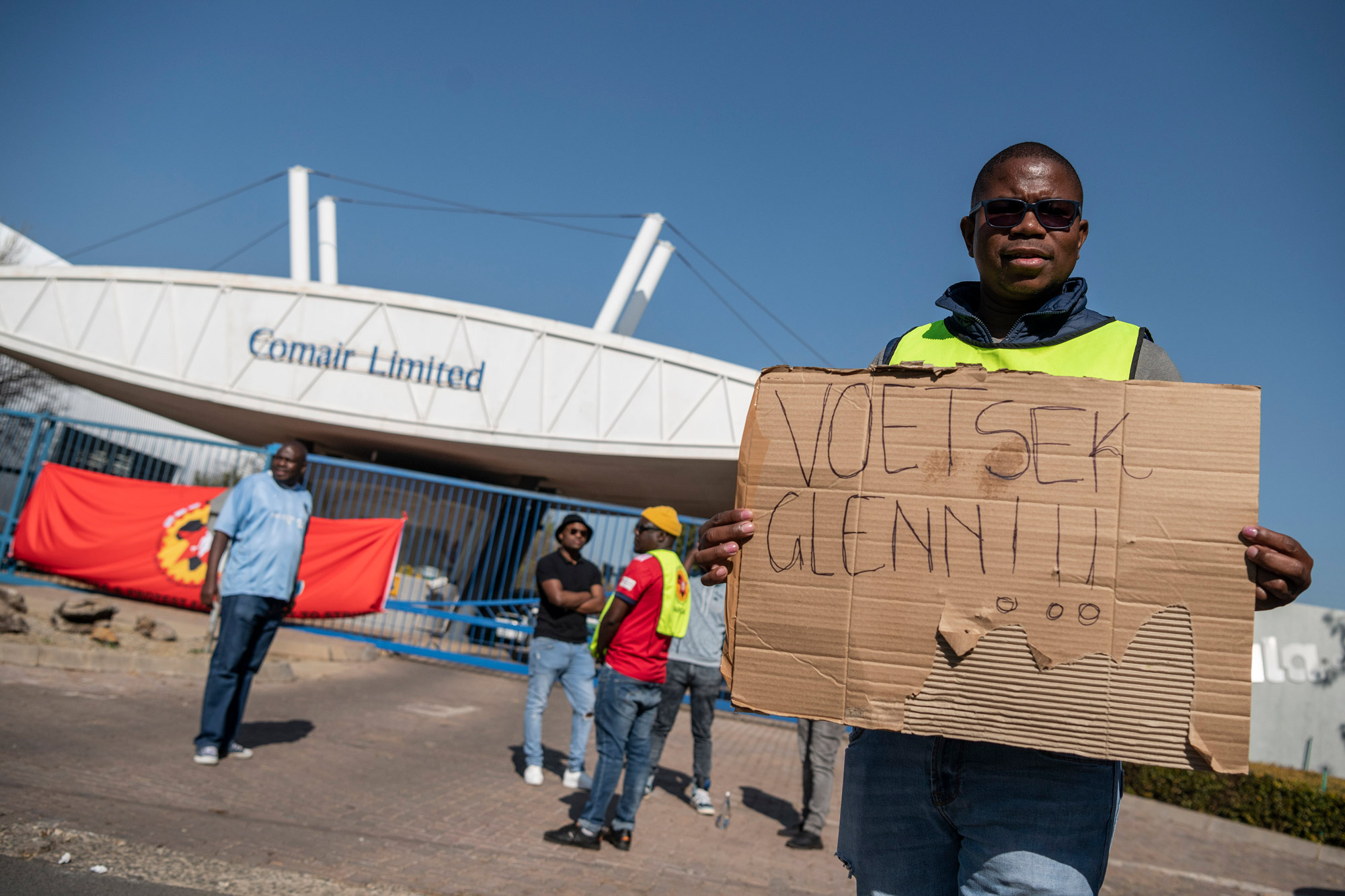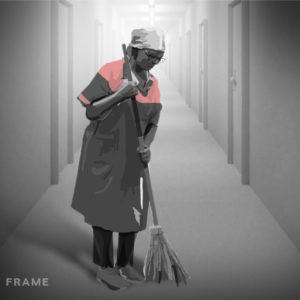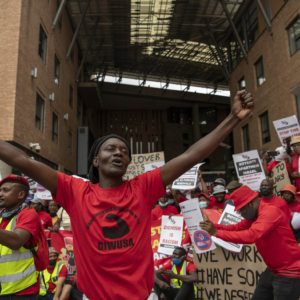Comair’s grounding just the latest blow for workers
The airline has been in business rescue for two years without a sign of relief for employees who have felt the stress of reduced pay, insecure jobs amid retrenchments and a heavy workload.
Author:
9 June 2022

Thalente Nzimande was looking forward to marking 14 years of service at Comair, initially as cabin crew staff and then in the baggage department, on 2 June 2022. Instead, while watching television two nights before the anniversary, she received a WhatsApp message from her station manager telling her not to come to work the following morning.
She and about 1 300 other Comair employees, including 700 members of the National Union of Metalworkers of South Africa (Numsa), have been left in limbo since 31 May when the 79-year-old airline announced out of the blue that it was grounding its British Airways and Kulula flights because it had no funds to keep planes in the air.
The uncertainty is taking a heavy toll on Nzimande. “I’m currently on anxiety medication and sleeping pills. I cannot sleep at night because I’m scared that I don’t have a job. Fourteen years – 14 years of loyalty. And this is how I’m thanked.”
Kholofelo Boshielo, 47, a cabin controller at Comair and a Numsa shop steward, added: “It was shock, a lot of anxiety, a lot of stress.”

Nzimande and Boshielo are among the 50% of workers who have avoided retrenchment, living instead with a 30% pay cut. The other half lost their jobs steadily through retrenchments over the past two years that the airline has been in business rescue.
With a drastically reduced staff, Comair’s remaining workforce has a heavier workload. “At the smaller airports you get one person who could literally sell you your ticket, 20 minutes later check you in, 20 minutes later board you on to the aircraft, and then that person must wait until that aircraft leaves and another one comes in and receive that aircraft,” Boshielo explained. “So one person is doing the job of four people. And the company wanted to reduce their salaries by 30%.”
Numsa general secretary Irvin Jim has been especially concerned with the airline’s downgrading of benefits to workers. “Crew are no longer offered food during their shifts and also not given their breaks as per the Basic Conditions of Employment Act. The company has implemented a policy of 35-minute turnarounds that has resulted in the safety standards being compromised. This is a foreign tendency in the company’s over seven decades of existence,” he said.
Comair’s suspension of flights was less of a surprise for Vuyo Mngomezulu*. “I saw it coming,” he said. “I can tell you now, with the current leadership, even if we can get a trillion dollars of funding we’ll still find ourselves in this situation.”
Years in the making
Mngomezulu and his fellow workers say their woes began in 2019 when Comair’s former chief financial officer, Glenn Orsmond, was initially appointed as joint chief executive officer of the airline, along with Wrenelle Stander. He was then demoted to work under Stander, then retrenched by Stander in March 2020 before making a comeback to replace Stander as sole chief executive in December of that year.
During the first Covid-19 lockdown, Numsa says, Orsmond breached a directive from Minister of Labour Thulas Nxesi that cash-strapped employers should apply for the Unemployment Insurance Fund’s temporary employee relief scheme (UIF-TERS) to cover wages.
Instead, Comair made workers use their annual leave to cover their time off. By the time the airline was placed in business rescue on 6 May 2020, many workers’ annual leave had been exhausted. Numsa believes it was done deliberately so that there would be no leave to pay out when workers were retrenched.
More than two years later, workers are still being told that Comair is unable to commit to paying their salaries for the month of June and the income they lost between April and December 2020 when they were not paid and had to survive on UIF-TERS payments. Boshielo says the impact of this has been “huge”. “In the cabin crew department alone, we have lost five people due to mental illness,” he said. “One lady had clear depression. She said, ‘I couldn’t come to work because today was my last day on earth.’”
Related podcast:
With the recent developments, relations between Numsa and Comair’s business rescue practitioners have soured further. In 2021, the practitioners threatened to remove permanent employees’ medical aid and other benefits by turning them into contract workers. In a press statement released on 8 June, Numsa reported that the practitioners were “unable to guarantee whether employees will get their salaries for the month of June and this includes the payment of medical aid and other benefits”.
Nzimande was grounded in 2015 when she had an aneurysm and depends on medical aid for her annual check-ups. “I’ve had an operation on my brain and I need medical aid. I cannot survive without medical aid [and Comair is] threatening to take that away.”
At one point, the practitioners tried to effect retrenchments before they had released their rescue plan, but they were prevented by the labour court, which said retrenchments could not take place before an attempt to rescue the airline had been made.
In March, the Civil Aviation Authority grounded the airline for two days on safety grounds after one plane experienced engine failure and another was forced to make an emergency landing. “We were not surprised as we have been warning the airline … of the dangers of their cost-cutting measures and that this would eventually have the impact of compromising safety standards by not giving their aircraft enough ground time for proper maintenance,” Numsa spokesperson Phakamile Hlubi-Majola said in a statement at the time.
Potential closure
The grounding from 1 June was much more ominous as it was not the result of fixable safety problems but because of rising fuel prices, rising debt and the impact of the pandemic, the airline said. Basically, it had run out of money to continue its operations.
Doubtful of this claim, Boshielo said: “Safair, Airlink and Comair are flying in the same places with the same price of fuel and oil. They live on the same planet where Covid was a problem. They have all these problems that have been cited by the chief executive and yet they have been profitable.”
A meeting held on 7 June failed to bring the workers answers. Debriefing picketing workers, Sandile Xheke, chairperson of Numsa’s Comair shop steward committee, said: “They are looking at [continuing the grounding] for a number of weeks. They have not secured an investor … The business rescue practitioners are quite hostile and literally giving us just two options: it’s either they get funding or they wind up.” The workers’ demand for Orsmond to resign remains unmet.
Meanwhile, Numsa says the government is standing by idly while Orsmond and business rescue practitioners collapse one of South Africa’s biggest airlines. “By this company closing down, it’s not only the 1 300 to 1 500 people who lose their jobs. There are also thousands of other indirect jobs. For example, SAA Technical, we are their only client. Should we close down, it is the end of SAA Technical,” said Boshielo.

While workers have lost their houses and vehicles as a result of pay cuts and retrenchments, Numsa says the business rescue practitioners have been paid R1 million a month for two years and are yet to come up with a plan to save the airline or improve workers’ job security.
Speaking in the context of the rising cost of living, Mngomezulu stressed that since 2019 the workers haven’t had their pay adjusted to keep up with inflation. “The buying power in 2019, three years down the line, it’s not the same.”
BRPs Richard Ferguson and Neil Hablutzel have hired Sandton-based corporate communications company Meropa Communications to deal with media questions about the grounding.
Related article:
Speaking through Meropa Communications, Ferguson and Hablutzel would not say whether workers at the airline would be paid at the end of June, or how much money was needed to get ComAir back in the skies.
“As negotiations are ongoing we are not presently in position to provide further details regarding funding,” they said, adding that while some potential investment looked promising, they could not guarantee when Comair would resume flying.
“It is not currently possible to put a time frame on how long it will take until these negotiations are concluded. If successful Comair will be able to resume flight operations relatively soon. If the BRPs are unable, with reasonable confidence to secure the working capital required, they will be left with no further option but liquidation,” said Ferguson and Hablutzel.
*Not his real name.


